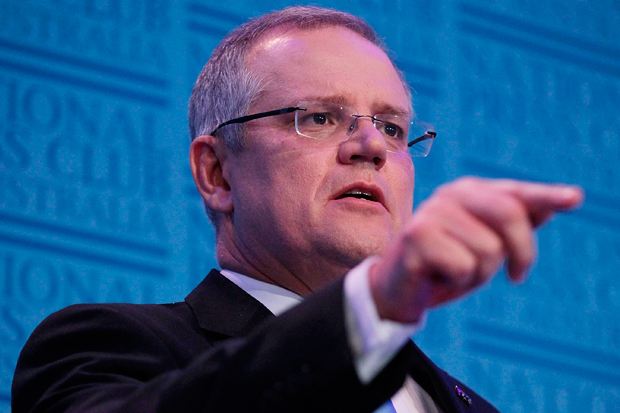It’s just the calm before the storm. Despite the apparent parliamentary resolution of the government’s superannuation fracas, the battle is far from over. Treasurer Scott Morrison’s confidence that he is achieving the great bulk of his superannuation outcomes (a big percentage of something is ‘better than 100 per cent of nothing’), should be tempered with the reality that his own wobbly backbench is going to be subjected to continuing ‘Delcon’ propaganda. It’s far too early for the sighs of relief at the hoped-for end of the months of uncertainty that had been fed by a Mediscare-like Superscare campaign that was damaging public confidence in superannuation. This managed to unnerve a great many prospective superannuees who would never even get close to being affected by the now-amended budget changes. Even after Morrison’s concessions last week, particularly in replacing the attack’s main target, the (falsely labelled ‘retrospective’) $500,000 non-contributory cap (with its entirely prospective tax consequences!), the government still faces some formidable opposition. This is particularly directed at Morrison’s determination to fix the superannuation rorts that have enabled a tiny percentage of rich people to extend retirement income incentives into an open-ended wealth aggregation and estate-planning system. It is poor public policy for this to be funded by tax concessions that place a budgetary burden either on other taxpayers or, by way of deficits, on future generations of taxpayers. But while the great bulk of stakeholders and superannuation industry experts have come out in support of the amended package and want things to settle down as soon as possible, there is no sign of the issue subsiding.
For example, the deservedly influential conservative think tank Institute of Public Affairs wants other taxpayers to continue to fund, through tax concessions, open-ended wealth creation by well-off Australians. The IPA opposes the government’s objective that superannuation exists to substitute or supplement the age pension; it wants no limits on what can be transferred into a retirement account. It rejects Morrison’s objective, as part of urgently needed budget repair, to ensure that superannuation tax concessions are directed to providing the retirement income for which they were intended rather than continue to be used to create very large balances, some far in excess of $5 million (even up to $50-$100 million). These may have been the acceptable and sustainable unintended consequences of pro-superannuation public policy in the Costello boom years, but it represents a gross misallocation of what the Treasury describes as ‘Tax Expenditures’ in the present budget deficit dog days.
And the Australian’s Judith Sloan continues her ad hominem attack on the amended package (‘a very small improvement’), describing it as the result of ‘shonky advice from deeply conflicted bureaucrats who are sitting on the equal of capital bases of $5-$10 million to generate their obscenely generous retirement incomes’. And the Treasury’s figures on revenue savings cannot be trusted; they are ‘all made up’ by public servants protected by their over-generous schemes. Sloan even opposes, as ‘the dumbest part of the package’, the government’s removal of the unfair tax rate on lower income superannuation contributions (LISTO) when these are higher than the contributor’s marginal tax rate. So the omens are not good for a constructive discussion of the public policy issues involved in retirement income – and perhaps even for the political future of this amended package.
Public policy creation in Australia now seems to rest on the proposition that no changes are acceptable if they involve any pain. This was (leftist) Ross Garnaut’s concern in his 2013 book Dog Days: ‘A new ethos developed within the Great Australian Complacency which held that there can be no losers from reform. Businesses demand compensation…Households expect no change will leave them worse off… These are reasons to be doubtful that our society will choose a public interest response to the [economic] problems that lie ahead’. But with the democratic process increasingly involving populist appeals to self-interest how do we get governments to pursue what really is the national interest – and to determine which of their constituents should suffer the necessary pain?
The post Business/Robbery etc appeared first on The Spectator.
Got something to add? Join the discussion and comment below.
Get 10 issues for just $10
Subscribe to The Spectator Australia today for the next 10 magazine issues, plus full online access, for just $10.
You might disagree with half of it, but you’ll enjoy reading all of it. Try your first month for free, then just $2 a week for the remainder of your first year.














Comments
Don't miss out
Join the conversation with other Spectator Australia readers. Subscribe to leave a comment.
SUBSCRIBEAlready a subscriber? Log in